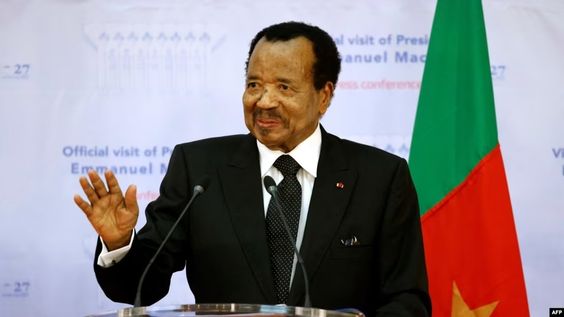Africa
The opposition in Cameroon urges for the nomination of a single candidate to confront Biya in the upcoming election

Leaders of Cameroon’s primary opposition party are engaged in discussions with over 30 opposition leaders to establish a unified candidate for the upcoming election in the event that President Paul Biya, who is 91 years old, becomes incapacitated due to poor health.
This response highlights the fact that Biya, who has been in power for over four decades, did not mention his intention to run for re-election in his New Year’s message, prompting the opposition to take action. Maurice Kamto, the president of the Cameroon Renaissance Movement Party, revealed that a platform called the Political Alliance for Change (PAC) has been formed by numerous civil society and political opposition members to advocate for Biya’s relinquishment of power. Despite the scheduled presidential elections in late 2025, civil society groups and opposition parties were anticipating an announcement from Biya regarding early elections in 2024, which did not occur.
Kamto has been selected as the single opposition candidate by the PAC in the event of Biya’s resignation or incapacitation, and he encourages disillusioned supporters of Biya’s CPDM party to join the PAC. Kamto emphasizes that the PAC is open to all individuals who believe that the current regime is hindering Cameroon’s progress and that those within the ruling CPDM party who demonstrate a patriotic awakening are also welcome. He pledges to restore the state institutions that Biya has allegedly damaged, facilitate an inclusive national dialogue to resolve the separatist crisis in the western regions, and improve the living conditions of those suffering from hunger and poverty.
According to the constitution of Cameroon, if President Biya were to pass away, resign, or become incapacitated, the 89-year-old president of the Senate, Marcel Niat Njifenji, would assume power and organize new presidential elections within 120 days. In his recent address, President Biya did not explicitly mention his plans to step down or remain in power, but he attributed the country’s current challenges, including corruption and armed conflict, to both internal and external factors.
President Biya highlighted that Cameroon, like other African nations, is grappling with an economic crisis triggered by the ongoing wars in Ukraine and the Middle East. He pointed out that while the world anticipated an end to Russia’s invasion of Ukraine, the resurgence of the Israeli-Palestinian conflict last October further strained international relations and negatively impacted the global economy. Biya emphasized that this conflict has led to price increases in consumer goods and contributed to shortages of petroleum products.
Despite these difficulties, President Biya stated that Cameroon achieved a 3.7% economic growth rate in 2023, with inflation kept below 7%. However, the opposition in Cameroon disputes these figures, asserting that the economic growth rate is less than 2% and inflation exceeds 20%. They hold President Biya accountable for what they perceive as an economic catastrophe in a country rich in mineral resources that could have been utilized for the development of the nation but were mismanaged by the current government.
Experts suggest that President Biya will be challenging to defeat in an election, as the opposition in Cameroon is fragmented, consisting of approximately 400 political parties. The Center for Human Rights and Democracy in Central Africa predicts that the opposition, including any candidate from the CPDM party, will face significant difficulties in surpassing Biya’s popularity.
In light of this, Kamto, a prominent figure in the opposition, urges all opposition groups and civil society organizations to unite behind a single candidate if early elections are called or when the presidential elections take place in October 2025. This call for unity aims to enhance the opposition’s chances of mounting a formidable challenge against President Biya and the ruling party.
